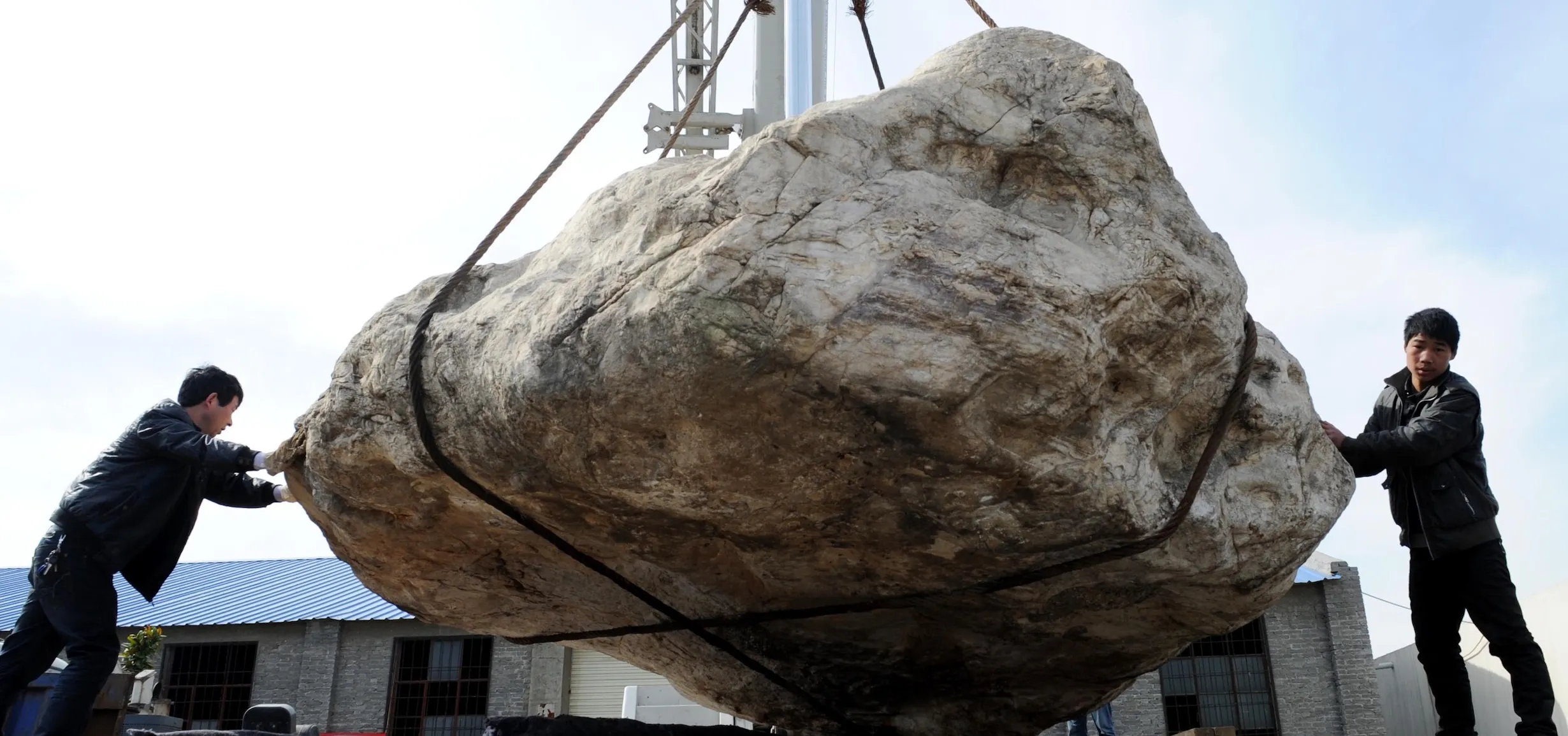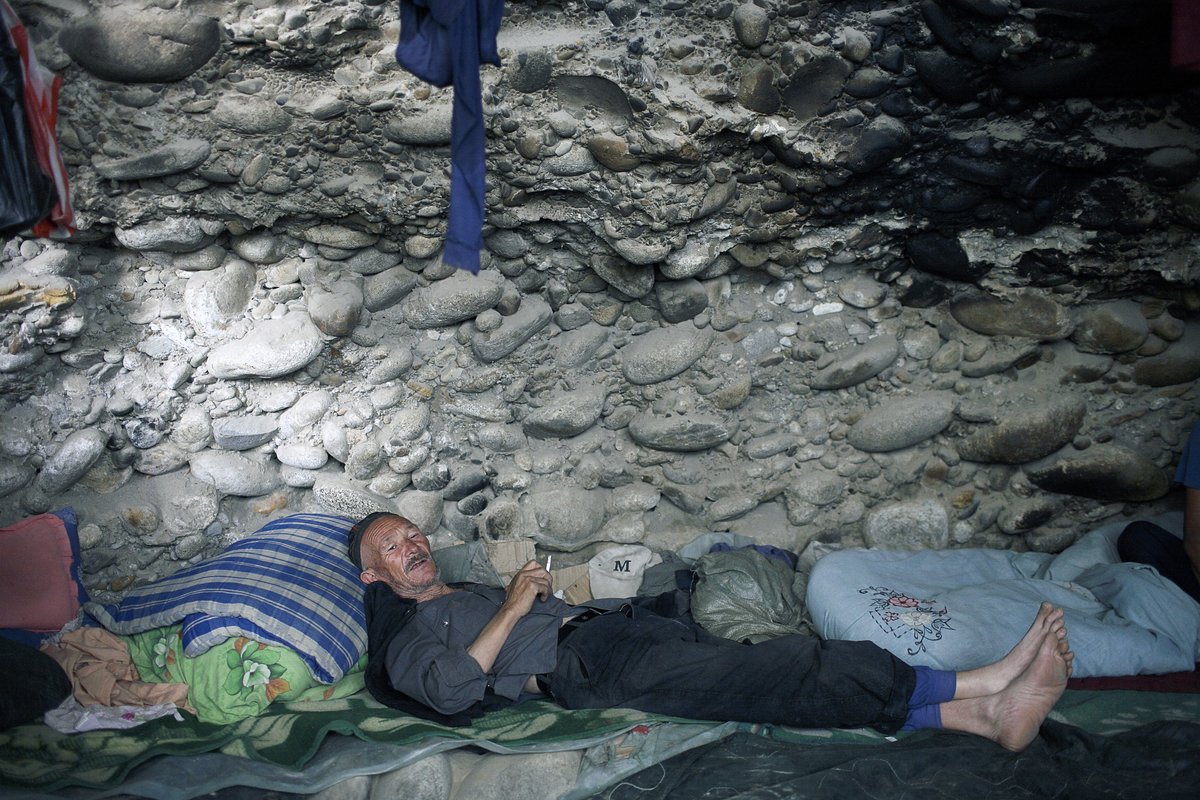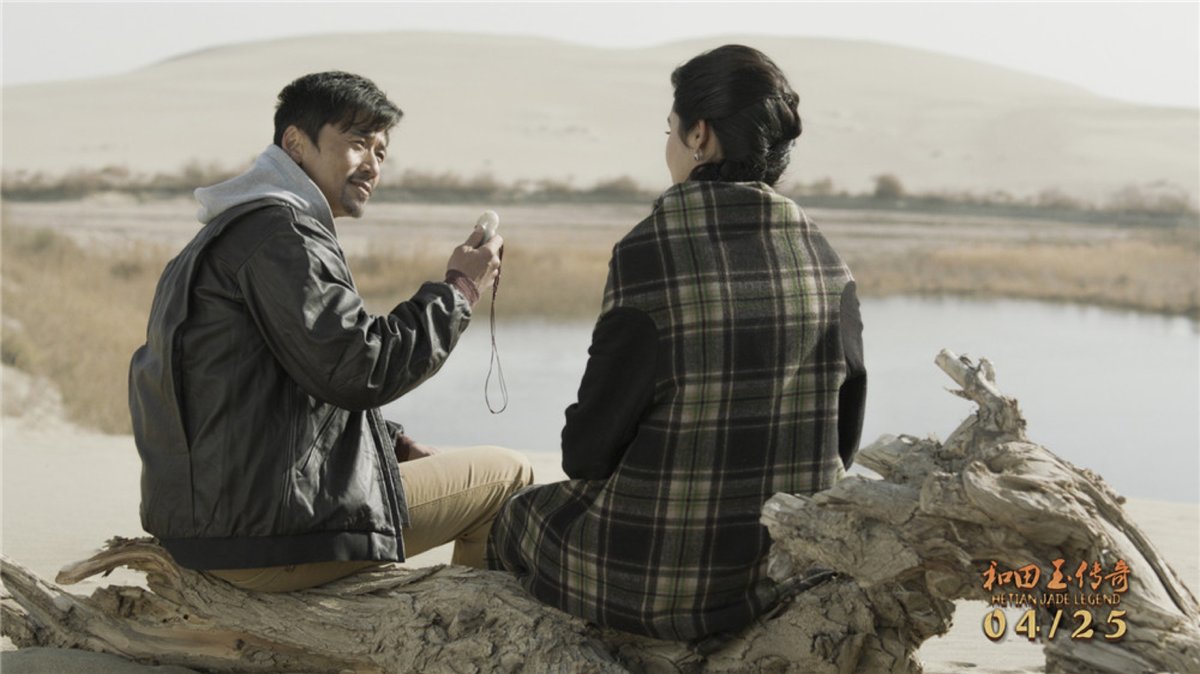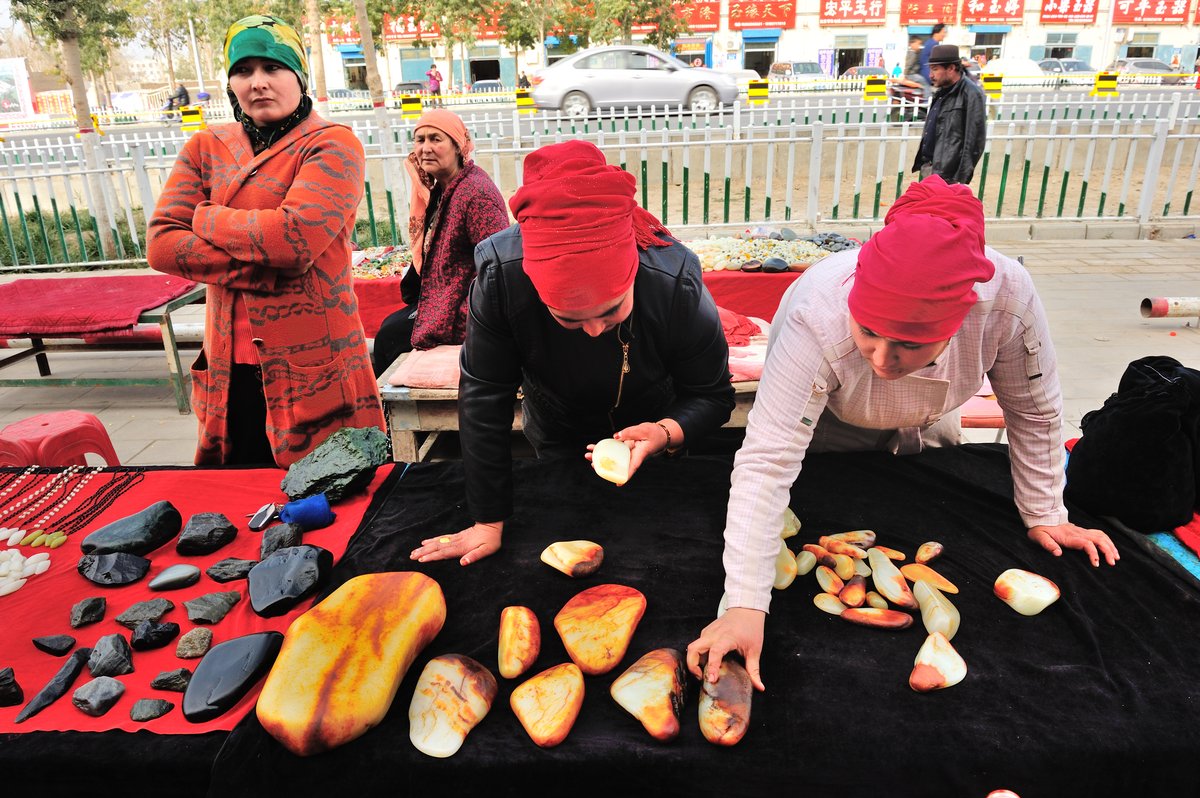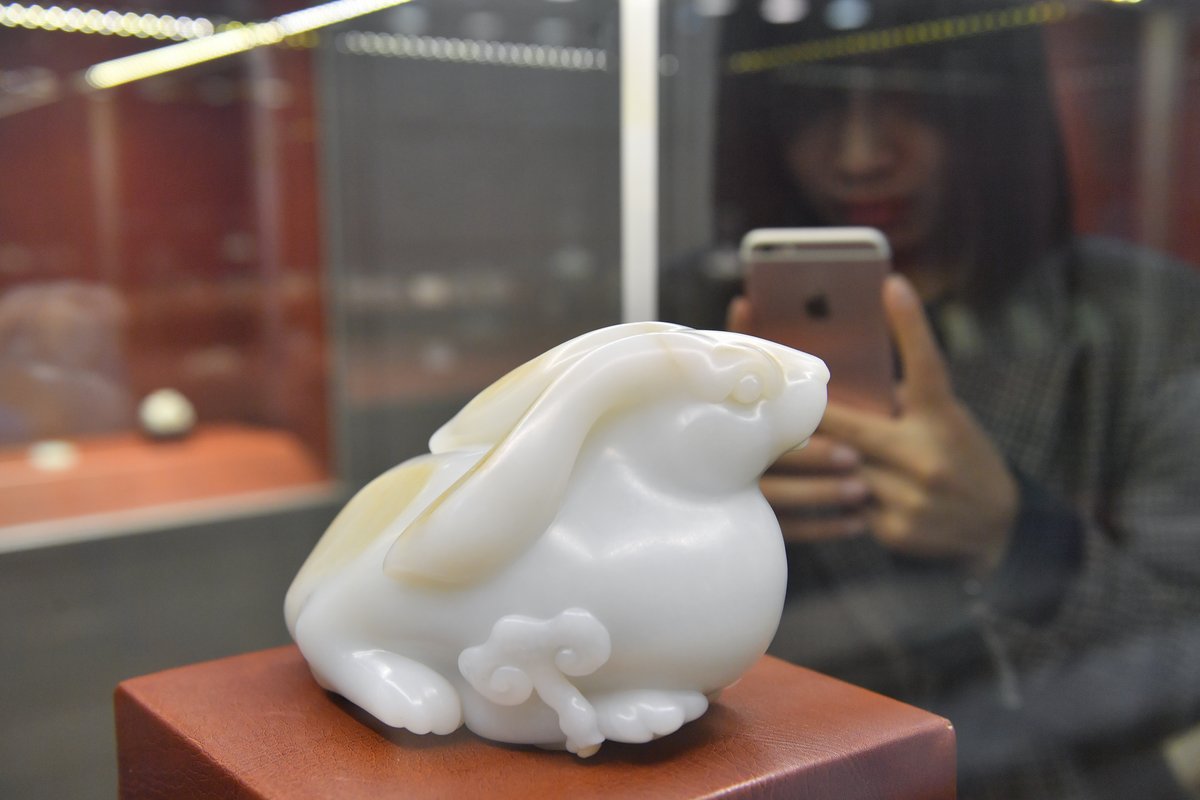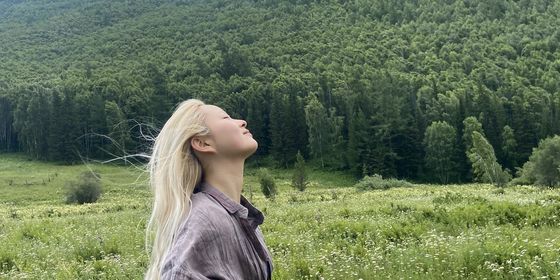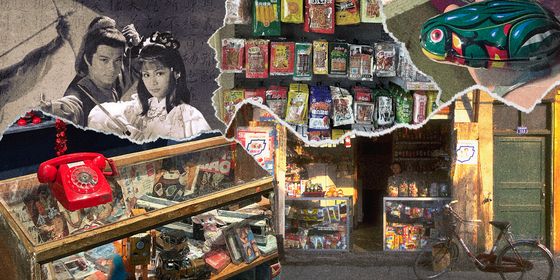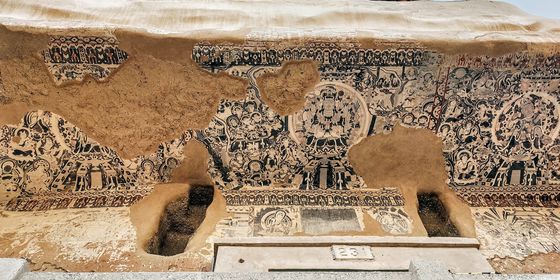A former Hotan jade miner looks back on a disappeared, dangerous trade
“There is a saying that has been known to jade miners since ancient history: ’A thousand men could venture out in search of jade, and only a hundred will return; of this hundred, only ten will find the right spot to mine. Among those ten, only one will get lucky.’ In fact, I might be exaggerating these figures.”
I first met Zongzong at a noodle shop in Urumqi.
I was working as an English translator at the time. A Swedish friend had entrusted me with purchasing Hotan jade ornaments as a birthday present for his wife, who happened to be obsessed with Chinese culture. A local friend helped me make my acquaintance with Zongzong, touted as an “absolutely reliable contact for jade.”
Over the course of our conversation, Zongzong found out that I do some freelance writing in my spare time. This prompted him to make a heartfelt revelation. “I will share with you the story of my days as a jade miner in Hotan, before I became a seller myself. It’s also the story of two generations of jade miners in the Kunlun Mountains.”
This is Zongzong’s story.
1
On the day Xiao Yao’er knelt in the yard as a symbol of the formal start to her apprenticeship, I had been a pupil to Master Ma for five years already.
In 1998, at the age of 18, I failed my college entrance exams and followed my father’s steps to Hotan. He sold dried fruits, traveling back and forth between Xinjiang and his native Hubei all year round. On one of his trips, he made arrangements for me to apprentice as a jade miner. Before arriving in Xinjiang, I had always regarded the whole concept of an “apprenticeship” as a relic of yesteryear. Only once I was here did I realize that the notion of an apprenticeship in our present era is tied to feelings of reverence and respect for the inheritance of traditional skills.
Master Ma was about the same age as my father. He was lean and had a dark complexion and a rather serious, dry temperament; he would only liven up when talking about the jade mining business. He had old-fashioned manners, a sound mind, and a good reputation, so nobody criticized his decision to take Xiao Yao'er, a girl, as his apprentice.
Xiao Yao’er’s first day started just like the day I began my apprenticeship five years ago. My fellow pupils got up early, set up tables and chairs, and prepared tea and dried fruits. The day before, Master Ma’s wife had cleaned a woolen carpet that was now laid in front of his old-fashioned wooden armchair. “Making a clean entry” into your apprenticeship was regarded as a crucial step. Therefore, Xiao Yao’er had taken a bath early in the morning, and her hair was still damp.
From his seat in the middle of the yard, Master Ma watched Xiao Yao’er kowtow thrice to him, culminating a ceremony where he opened a sachet resting on his bosom and handed over to the girl a white jade pebble that he had extracted with his own hands a few days prior. Tradition in the jade mining trade dictates that the master must present the disciple with a fine piece of jade of their own finding. On this solemn occasion, Xiao Yao’er received a piece worthy of a collector.
Master Ma cleared his throat: “There is a saying that has been known to jade miners since ancient history: ‘A thousand men could venture out in search of jade, and only a hundred will return; of this hundred, only ten will find the right spot to mine. Among those ten, only one will get lucky.’ In fact, I might be exaggerating those figures. Young lady, your name bears the character ‘Yao (瑶 yáo)’; I reckon your bond with jade was predetermined by fate. This old man is also making an exception in accepting you as his apprentice based on his fateful bond with your father. My request to you is not that you will always find fine jade, but that you will always put safety first.”
I was standing aside with a group of fellow disciples, and we all saw Xiao Yao’er’s square face flush. She touched the jade pebble that Master Ma had gifted her, collecting the piece in her hand with great care. Then, she raised her head and glanced timidly at us before nodding.
Before the arrival of Xiao Yao’er, Master Ma’s home might as well have passed as a monastery, populated only by adolescent boys except for his own wife. Master Ma had endured his share of “short-term disciples”—kids who dropped out and returned home after a few weeks, unable to endure hardship, or scoundrels who followed him once into the mountains to load up on fine jade that they could immediately sell for money. Once these quitters left, Master Ma’s household shrunk down to a handful of people—a fellow male apprentice named Da Wei who was my senior, a young mute boy, and myself.
Da Wei had been under Master Ma’s wing for many years, so he had learned a few things. The mute boy got by with odd jobs and chores. Xiao Yao’er was a newcomer who was much younger than us, so she didn’t interest me much; back then I was still together with a girl in Hubei that I’d known for over a year. However, Da Wei and the mute boy had been bachelors for many years, and they were thrilled at the arrival of this female pupil.
The girl’s father had also been a jade miner in his youth. He died in the trade, having lost his way in a great snowfall during a mining operation. His widow, Guli [Editor’s note: a name generally associated with women from Turkic ethnic groups in Xinjiang], took great pains to rear the now orphaned Xiao Yao’er before her own passing from a terminal illness when the child was 17 years old. At death’s door, Guli entrusted her daughter to the Ma family. Initially, Master Ma was merely looking for a maid to help his wife with household chores. However, Guli confided in Ma’s wife that her late husband had never managed to find good jade, not even at the time of his death. Now, the dying woman wanted Xiao Yao’er to officially join Master Ma’s household so that she could take over her father’s profession.
There was another reason why Guli chose to entrust her daughter to Master Ma—he had mixed blood origins, just like Xiao Yao’er. Jade miners in Hotan divided themselves into a series of factions based on multiple factors; their ethnic origins, their birthplace, and their mining techniques. Some exclusively mined in riverbeds, others only in mountains. Master Ma’s own status as a “half-breed” made him a sort of neutral agent. He did, in fact, get along fairly well with everyone in Hotan.
Over the years, the majority of the jade-mining crowd in Hotan came to be composed of either experienced old men or strong youths. There were also some Uyghur men that sent their wives to the mountains or the riverbeds in search of jade. However, there was yet to be a single female master out of these women who could truly locate jade, bring it down the mountain, extract it, ascertain its quality, and sell it for a substantial profit at the marketplace.
2
The mountains were still buried in thick snow in early spring, so we couldn’t go there to extract jade.
Master Ma used to say that jade mining was something for the old man in the sky to arrange. If someone went into the mountains and found their way into a mishap, that was surely a sign that they were ill-suited to eke out a living in this line of trade. In order to prevent accidents, you must ensure you are in the right company at the right time and place. You need to ask around, and avoid following in the paths where people have met with accidents. A headache, a fever, or a limb injury all barred you from engaging in jade mining; so did a woman’s special time of the month. The season and weather were just as crucial: snow in autumn, winter and early spring was a deal-breaker. Jade miners in Hotan looked forward to the period between June and August as their peak season.
Master Ma asked Da Wei and me to take advantage of the off-season to teach Xiao Yao’er the basics of jade mining. I usually just found a rock to sit on and watched TV, leaving the bulk of the instruction to Da Wei. He was far more willing to mingle with Xiao Yao’er, anyway.
Da Wei’s teachings were very thorough indeed. “Young sister, don’t forget to warm up and stretch before entering the mountain, and make sure to walk step by step once you’re up there. The steeper it gets, the lower you need to keep your center of gravity. Let out all the air when you exhale and never rely only on your feet to exert force. You need to use your hands, your back, and your head too, so that you won’t get tired.”
Xiao Yao’er accompanied us several times on our incursions to the foothills. Whenever climbing was involved, we positioned ourselves behind her, with Da Wei on close watch. Looking up, we could see the girl’s slender, snow-white waist. On our way down, Da Wei would lead at the front and stretch out his hand to assist Xiao Yao’er on the many occasions where she’d lose her footing.
I was always under the impression that Xiao Yao’er wasn’t very serious about the trade, and it’s likely that Da Wei caught on as well. Often, he would admonish her sternly. “Descending is far more difficult than going up, slow down now before you can’t pull the brakes on your fall.” Xiao Yao’er reacted to his advice like a spoiled child. “You’ll be there to help me if I slip, anyway!” Da Wei’s heart softened, and he said no more.
***
With the weather gradually warming up, Master Ma said that we should prepare to go into the mountains. Da Wei made me go with him to the bazaar, where he feigned some excuse to ditch me halfway and run his own mysterious errands.
I went back home alone when the sky was still bright. Standing in the courtyard, I could hear Master Ma teaching Xiao Yao’er in the main room: “Us jade miners rely on the Kunlun Mountains, also known as the Jade Mountains, for our sustenance. They pass through Tibet and stretch up to Qinghai. The jade produced in the east of the Kunlun Mountains takes their name, while the jade hailing from the north region is known as Hotan jade, one of the four great varieties of this mineral in China.”
Xiao Yao’er spoke with a crisp voice. “Why won’t Master go into the river like everyone else?”
Master Ma’s reply came tinged with disgust. “Don’t pay heed to those old Uyghurs with their quackery that you can tell jade from common stones by the touch of your feet in the river. The Yurungqash River does not carry any great jade in its course. The mountains are still where the finest stones are to be found. You’ve now grasped the foundations, and your physique has improved since your mother’s passing. Next week, when it’s warmer outside, we’ll go to the mountains.”
Master Ma always sang Xiao Yao’er’s praises to us, calling her a smart girl who was quick to remember things and had no trouble asking questions. She was nothing like us gawky idiots, for whom a short period at work mining jade was enough to kill our conversational skills. I always felt that Master was biased—hadn’t we all served him as errand boys for a year and a half before we were allowed to follow him into the mountains? The young mute boy still hadn’t been allowed; he was forever stuck at home. But Xiao Yao’er was almost immediately permitted to follow us on our incursions.
After a few days, the snow line crowning the mountains in the distance had moved up significantly. Master Ma asked his wife to prepare everything we needed for our trip: naan, dried fruit, beef jerky, seasoned spicy noodles, cumin powder, and a kettle. I was tasked with ordering a new set of ropes and canvas bags. Our luggage also featured digging tools such as awls and an assortment of items—flashlights, tents, commonly used medicines, and several large, bulging bags of toilet paper. Additionally, Xiao Yao’er took a bag of clothes that her mother had arranged for her, including summer outfits and padded sweaters, because weather in the mountains was unpredictable.
3
On the eve of our trip to the mountains, we all had our fill of food and drink and a refreshing bath before undergoing Master Ma’s health check-up.
Early on the next morning, he rolled up his prayer rug and we boarded a bus with our luggage. The coach took us to a village at the foot of the mountains, where we rented two donkeys to carry our supplies and entered the mountains.
The journey was long, and the round of questions and answers between Xiao Yao’er and Master Ma was entertaining enough to shake Da Wei and me out of our usual apathy.
“Master Ma, where is the jade mine? How did you find it to begin with?”
“Several large jade mines in Hotan have a history spanning over hundreds or even thousands of years. After operations stopped at some of them, everyone gradually forgot the location of those lodes. Our destination is over 10 kilometers away from the edge of the large former mines, where I once went. Those who accompanied me back then are now either old, pushing daisies, or retired from this trade, so the map is now in my mind only. I am your sole guide.”
Master Ma had been asked this question by nearly everyone who knew him, but he always laughed, eluding a reply. Not even our pestering in private managed to get more than a few perfunctory words out of him. However, I had heard from the older generation that seasoned jade miners usually only memorize the location of one jade mine from which they only ever extract a small amount of the mineral every time, so it can be sold for a high price. These masters would then go on to pass their secret down to their heirs, and their families would live on that knowledge for generations. All of them could trace this line of work back to their ancestors, and they all began going into the mountains from their youth. They’d almost been around almost ever part of the Yurongqash Mountains. Their hearts were dotted with the locations of these mining sites.
***
After a few days with us in the mountains, Xiao Yao’er’s cheeks turned a glowing red. While Master Ma was resting, Da Wei took out a tin box of vanishing cream from his pocket and handed it over to the girl. “Goodness, I really am forgetful, young sister. I bought this earlier for you, then forgot to take it out. Once you apply it, your face will not be chapped. Good stuff from Shanghai!”
Xiao Yao’er took the small tin box and thanked him without embarrassment. She glanced at the yellowed cover of the copy of the Complete Works on Jade that Master had given her. I thought to myself that Da Wei was far too behind the times; what were the odds of today’s young girls still using vanishing cream?
We unloaded our things on a mountain pass shielded from the wind and tied the donkeys to the tree. I picked up a large rock, took out the brush we’d brought with us, and used it to write the character for “horse” on the rock—Ma, our master’s surname. He pointed to the rock and told Xiao Yao’er: “These are the rules of our trade: if we happen to be lucky enough to take the big prize home, we get to write our names on the jade. This way, even if any of our peers see it, they’ll know not to claim it. By the same rule, any marked materials we see on our way are off-limits.”
Xiao Yao’er replied: “So what if we took something? It’s not like anyone would find out.”
Master Ma grinned. “Young lady, you’re still but a child. Whether Uyghur or Han, everyone knows that the heavens always keep an eye on the earth. Who would dare to ruin their luck with such dishonest, unkind acts?”
***
We walked for another two days before finally reaching the small jade mine we’d been looking for. Master Ma shared with us a story: “Once, a rich man from Shanghai fell in love with jade and took to the mountains to find it there. Though he did manage to extract a few pieces of white jade in good condition, the rich man passed away halfway through his journey, perhaps due to altitude sickness. In accordance with the rules, we divided the jade into several parts and shipped his share back to Shanghai. He was gone from this world, but left behind something in his eternal remembrance. Therefore, this site is known as the ‘Young Master’s Mine.’”
Once Master Ma laid out his prayer rug and recited the scriptures as it is mandated, Da Wei helped him hang up the ropes, and they began climbing the cliff next to them. Xiao Yao’er let out a sigh of amazement at Master Ma, whom was usually so reluctant to exercise: “How can you climb mountains so well?”
Her admiration made me laugh: “Master has enjoyed watching goats and their posture as they climb the mountains since his childhood. The cliffs that plenty of young people can’t tackle, Master will climb to the top in a few minutes. Climbing is the greatest skill that jade miners possess.”
With this said, Xiao Yao’er and I picked up the soft grass from the bottom of the mountain and laid it out along the edge of the mountain wall.
At that time, we didn’t have one of those small cordless electric drills that are common now. Seasoned jade miners all know that the most crucial steps in “chiseling jade” involve choosing the right spot to start from, mining the right size for the awl and hammer and applying the right amount of force. These all factor into whether you will be able to extract the jade from the mountain wall intact—as the saying goes, “In ten pieces of riverbed jade, you’re bound to find nine that are cracked.” A rough start to the chiseling process may cause the whole piece of jade to crack, impacting its price in the market. However, if you don’t apply enough strength or choose the wrong set of tools, this semi-precious stone will remain firmly nested in the heart of the mountain, unreachable to your unskilled hands.
Xiao Yao’er stretched her neck until it was sore to make out the shape of Master Ma, busily working halfway up the mountain. She then rubbed her nape and complained: “Brother, this chisel is too slow. Why not use explosives to blast the mine, like they do on television?”
This irked me. “Master said that when he was a child, for about six years, some folks did just that. Long story short, they were unable to extract any material in good condition. What they did get from the mine had to be discarded because it was of no use. Many of the mines were scrapped and could not be used. This is slow, meticulous work, got it?”
Meanwhile, Master Ma and Da Wei had dug up a large piece of material that they tied directly to Da Wei’s back so that he could slowly make his way back to ground level.
I helped Da Wei unload his cargo and apply some ointment to his bruised back. Master Ma also came down slowly along the rope, assessing the situation. “We got some 40 kilograms this time…shouldn’t be a bad haul once it’s all said and done. Let’s go back home.”
Master Ma often said that the most exquisite jade is hidden in the depths of the mountains, and that mining jade was tantamount to asking the mineral to abandon its birthplace. Therefore, every jade miner worth their salt had to extend a respectful invitation of sorts to their coveted material. For the jade to willingly leave behind its stone manor and submit to the hands of men, this invitation had to come from a sincere heart. Thus, Master Ma added this time, “You two, with your backs unscathed, should bow in deep reverence to both Da Wei and me, since we are carrying the jade.” Master Ma instructed Xiao Yao’er and me to kowtow to them while saying: “Please come into our house.” Seniority was not relevant in this ritual. Our return trip would only officially start once we had completed these rituals.
On our way down the mountain, Master Ma and Xiao Yao’er brought up the rear of our small group. He directed the girl’s attention over to Da Wei. “See? We also have our tricks to bring our haul back down the mountains with us. The materials that we carry on our backs should always be packed in special, thick cloth bags. The rope on Da Wei’s body is also tailored for extra strength. Although he keeps a live buckle on the rope, you won’t be able to undo it if you don’t truly know your way around the knot; you will only be able to cut it with a knife. Whoever’s carrying the jade can’t sit on the ground when they’re resting. Otherwise, the jade will topple down and they will follow behind. You must try and find a flat stone of a suitable height where you can place the jade, so that you may squat to rest some on the way. Many factors come into consideration, young lady, and just one of them is enough to bar you from taking the jade home. Take your due time learning everything.”
4
On the day we opened the jade, we extracted a few large stones with a faint emerald color that we then stacked neatly in the courtyard. Master Ma was in charge of the carving, and he had good connections, so that the old Uyghurs who sold jade at the bazaars all came. The young mute apprentice hurried to greet them.
Master Ma did his ablutions, finished his prayers, and shouted to our fellow female disciple. “Xiao Yao’er, you get to take a look first this time.”
Xiao Yao’er turned on a small red flashlight and took a step forward to inspect the two largest stones carefully. “Master Ma, I reckon this stone showing a little blue here is no good. The other one looks ugly, but it’s good in terms of weight and I suppose there’s white jade in there. I’ll leave any other pieces to my elder brothers to assess them.”
In theory, telling good jade from bad is not that difficult. However, those truly skilled at it are few and far between.
Hotan jade [Editor’s note: also known as Khotan or Hetian jade] typically comes in a variety of colors—white, blue, black, and yellow. A first, sifting will get rid of any jade that is mixed with variegated colors. Master Ma taught his disciples that the smoothness of the texture came first and foremost; ideally, it should feel warm and smooth to the touch, not dry. Toughness came as a second factor of sorts. Real Hotan jade should remain unscathed after it’s been scratched with a knife or a key. Other aspects should also be taken into account, such as transparency. Hotan jade, also known as nephrite, is unlike the jadeite that is imported into China from Myanmar. Any piece that is translucent and permeable will actually be considered defective goods.
Some people will take a flashlight to the piece they’re appraising in order to inspect the texture of the jade at its surface. In this inspection, you want to look for threadlike lines and strands and for obvious, uneven, cotton-like shapes. Most of these indicate spots at risk of cracking during the carving process. If the jade has these defects, it couldn’t even be made into jade beads, let alone heavier pieces such as pendants.
Master Ma probably felt that Xiao Yao’er’s judgment aligned with his own. Therefore, he said to his colleagues crowding the courtyard: “Well then, let’s follow the young lady’s assessment and open these two pieces first.”
The sound of a chainsaw overwhelmed everyone’s whispers for a while before leading to a round of cheers. Just like Xiao Yao’er had anticipated, one of the pieces revealed a chaotic mix of light green jade and stone. With poor permeability traits and plenty of impurities, it was virtually worthless. The other piece, meanwhile, was pure white jade, smooth and clean.
The crowd of old Uyghur merchants took out a calculator and started bargaining with us on the spot. Master Ma removed the “dust,” peeling off the rock shell. The jade was classified according to its grade, as big as a palm, warm and pristine white. Master Ma and the old Uyghurs each took out their own electronic scales in order to keep the other side honest. The crowd checked the weight, coming in at several dozen grams, and the piece of jade was eventually sold for 140,000 yuan.
Word of Xiao Yao’er’s ability to tell good jade from bad quickly spread far and wide. Master Ma told his own wife over dinner: “I think this child can bring me prosperity. See how many times I went out with all those kids, and I never brought back so much.”
Da Wei took more and more more to Xiao Yao’er, talking often about her cleverness at night. Even the mute boy showered the girl with attention. Any fresh fruits and vegetables in the house, he’d save for Xiao Yao’er first. I was probably the only one who didn’t warm up to the girl.
Master and a bunch of us divided the money on a ratio of 40 percent for him, and 20 percent for each of the rest of us. It was a good trip into the mountains indeed. After taking the money, we all agreed that we wouldn’t content ourselves with whatever was leftover from Master Ma’s wife’s plate. Only a good meal at the bazaar would do for us that day! We even invited the young mute boy, even though he’d never made it to the mountains. Master Ma thought that since he couldn’t speak, he’d be utterly helpless if something were to happen in the mountains.
It was a rare occurrence for him to go out to eat. He used gestured to place his order with the waiter from the menu. Da Wei sat down next to Xiao Yao’er and asked her whether she had any plans for her part of the money. Xiao Yao'er looked at the dust rising outside the courtyard and replied: “I’m saving it all up. This windy, sandy place is all I’ve ever known since I was a child. I’m going to wait for my chance to go see the vast sea, just like in the films, and a dolphin show too. How about you, brother?”
Da Wei scratched his head. “Me? I just want to learn everything from Master Ma, though come to think of it, I wouldn’t mind venturing out someplace.”
The young mute boy likely hoped that he could accompany Master Ma to the mountains to learn from him as soon as possible. I also had my own plans at the time; I wanted to buy one of those little cars I had seen in advertisements.
5
Over the course of the next two years, the price of jade fluctuated as the market opened. We always gathered from May to October to go extract jade in the mountains, and most of the times we came back with a small harvest on our backs.
Needless to say, there were times when we returned empty-handed from our incursions. Once we entered the mountain and reached the mine site, only to have the weather change rather drastically. The wind picked up as the clouds became thicker. Master Ma called the group to retreat and we hurried to a farmer’s house at the foot of the mountains. Later on, news came that a fellow jade miner who had remained on-site to “wait and see” had died in the mountains. This only made us admire Master Ma’s decision even more.
Xiao Yao’er herself was diligent, and she read all the books that Master Ma gave her so many times that the edges were worn. She paired her wits with Master Ma’s careful guidance every time she went into the mountains, and she gradually became one of the few female jade miners in Hotan. She grew up into quite the slender, nimble woman.
Midsummer came again, and we chose the best time to go into the mountains. Though Hotan’s urban area was scorching hot, the mountains were rather cool. That year, Master Ma suffered from a host of minor ailments, lost weight, and realized his eyesight was not as good as it used to be. For the first time, he relied entirely on Xiao Yao’er for the process of telling the jade apart.
Xiao Yao’er had long ago memorized the way to the “Young Master’s Mine.” She took a flashlight to the jade we’d picked, carefully checking the transparency, texture, weight, and skin, before discarding one of the larger pieces. Da Wei was reluctant to abandon the piece, stating that he still had the strength to carry it down the mountain along with the rest of us. He thought that we were risking a loss if the piece later proved to be a so-called “jade within stone”—seemingly worthless rocks that gamblers buy at high prices on the chance that there’s precious jade inside. But Xiao Yao’er was confident that the stone with worthless, and we ultimately listened to her and returned with only the pieces she’d approved.
It was not unheard of at the time for herdsmen to occasionally and quietly follow jade miners to take home what they left behind. This is what they did with the piece that Xiao Yao’er had determined to be worthless. Later, we found out that it was indeed nothing more than a lump of miscellaneous stones.
Gradually, requests for partnership rained down on Xiao Yao’er, as everyone hoped to spare themselves from carrying worthless junk home just by relying on her skill to tell apart jade on the spot. However, she turned down every single proposal, doubling down on reading her master’s teachings. Master Ma himself often bragged, saying that his one female apprentice far surpassed his other idiots, as he dubbed us.
Though I was jealous, I had to admire her keen eye.
6
In 2004, winter shrouded the mountains in heavy snow. This was the sign I awaited every year to return to my hometown in Hubei. Every other week, I would call Master Ma’s wife to chat. She told me that Da Wei and the young mute boy were helping her manage the herds and tackle the household chores. Xiao Yao’er had learned some simple jade carving techniques from Master Ma’s friends, and made some small presents of jade to Master, his wife and her fellow senior apprentices. She even gave small pieces to a Fujian jade merchant who often came by for business.
On one such call, I learned that Xiao Yao’er was in love, which got her a beating from Master Ma—though not because of any “old-fashioned” ideas of his. As it turned out, Xiao Yao’er had chosen as a boyfriend none other than Master Ma’s unfilial son, who had been away from home for many years. Da Wei told me on the phone that the lights in Master Ma’s bedroom had been on until the early morning for several nights in a row. He was likely unable to sleep a wink.
I reckon that Xiao Yao’er broke Master’s heart that time.
Master Ma’s son was named Qiangzi. Once, at the start of my apprenticeship, I’d heard Da Wei mention that he was really the most senior apprentice in Master Ma’s household. He’d followed his father into the mountains since he was a child, and he was an expert when it came to mining and telling apart jade.
Though the different jade mining gangs mostly kept to themselves and tried to stay on respectful terms with one another, there were plenty of ruthless scrambles for the best spots. Master Ma was generally of the opinion that “peace was highly valuable, while suffering adversity was sure to bring many blessings,” so he didn’t care to compete with others. However, once he met with the so-called “Henan Gang” at a jade mine. Master Ma immediately made polite arrangements to change places, but the Henan miners were still highly antagonistic and even insulted Master Ma. He went to reason with them, only to escape from the quarrel with a broken arm. With only a few apprentices around, Qiangzi included, and most of them rather unwilling to fight for their lives, they lost miserably to the Henan Gang.
In the eyes of Master Ma, though, Qiangzi’s worst offense was not that he didn’t help his own father, but that he took advantage of the situation to slip down the mountain with some raw materials that belonged to the Henan Gang, thus breaking a big taboo.
With the jade trade being so small a circle, it is not difficult to make any necessary inquiries on the mining, carving and eventual selling of any given piece. Once the jade that was stolen from the Henan Gang was properly processed, more than 50 grams of pure material were extracted from the piece. Inspection revealed it was a superior black jade with no impurities in sight. Qiangzi commissioned a jade carving master to carve a sculpture in the shape of a pixiu, a mythical animal said to bring luck and ward off evil, and promptly sold the piece to a Taiwanese customer for over 300,000 yuan.
When the Henan Gang learned of the fate of their stolen goods, they were naturally unwilling to let it slide. They sent some men to Master Ma’s house, who took every single valuable item they could get their hands on. Master Ma was familiar with how matters were settled according to codes of honor in this world, so he did not seek revenge. Qiangzi must have heard what happened, for he never returned to his family home and abandoned all his filial duties. Rumor had it that he’d gambled away the money he made from his illicit deal in Urumqi. From that moment onward, he only dropped by Hotan occasionally, to buy jade seeds and make money from the skills his father had taught him.
Qiangzi was a rather smooth and slick character, so he was a natural at charming girls. Besides, he had probably also heard of the fame Xiao Yao’er had amassed. I don’t know how they met, but they stayed in touch over mobile phone, until Master Ma figured everything out and brought a sudden end to the affair.
A week later, I called Master Ma’s wife to check the state of things. She advised me not to bring up the matter again, and sighed, “After so many years of devoted care, nothing could quite compare to the sound of money.” However, as it turned out Xiao Yao’er was eventually made aware of Qiangzi’s past, and could still tell right from wrong. She bowed to Master Ma in repentance and promised she’d never get in touch with Qiangzi again.
After this incident, Da Wei still treated Xiao Yao’er fairly from the bottom of his heart, but the word “like” was noticeably absent whenever he spoke of her from then on.
***
In the spring of the second year, I caught a cold. This caused me to return to Hotan half a month later than originally planned. After a few days and nights on the train, I was still en route to Master Ma’s house when word of Da Wei’s death reached me. On his way down the mountain, Da Wei was crushed and killed by his own heavy cargo. As he fell, the stone crushed his chest. I didn’t have the chance to see him again before his tragic passing.
I remembered the earliest part of my apprenticeship, when I was not strong enough to climb the mountain. When my muscles and bones ached at night, Da Wei had been there with a hot towel that he used to compress and massage my cramped and swollen legs. He would roll his cotton-padded jacket into a ball to prop up my feet when I slept.
When the temperature fell in the mountains, Da Wei would take off his sweater and offer it to Master Ma. Our meals in the mountains mostly comprised dry food, but Da Wei’s ability to find wild edible mushrooms gave us an additional treat. At home, Da Wei brought worthless pieces of broken jade for the young mute apprentice to play with, doing his best to teach the boy the most rudiments of jade mining.
I sighed with sorrow that the life of such a good man being cut short—Da Wei never even got to leave Hotan to see the outside world.
When I finally arrived at Master Ma’s house, he had resumed his smoking habit that he’d abandoned long ago and voiced his complaints to me. “I don’t know what came over this dumb idiot. Why on earth did he turn around to help others when he was carrying jade on his back? Such a heavy load, and the hill was so steep. I saw his body roll over dozens of times, and the hole in his chest was as big as the mouth of a pot. Blood was gushing everywhere…”
The eyes of Master Ma’s wife were also red as she bawled away: “That girl, Xiao Yao’er, was always tumbling down the mountains, I lost count of how many times, and Da Wei rolled down the mountain just to help her…what a waste.”
That was the moment I gave up on my old dream of staying in Hotan to pick beautiful jade and make a lot of money. I went back to my hometown for a while, before finally settling down in Urumqi to sell jade. I never returned to Hotan to collect jade again, even though Xiao Yao’er called me several times. A certain remnant of hatred in my heart kept me from ever answering her calls.
The lives of jade miners have always been far too cheap. In the early days of the trade, most of them did not even bother buying any insurance. In fact, they signed a waiver of liability before entering the mountains. In the event of an accidental death, their masters and employers were not liable for compensation. The bereaved family only ever got the miner’s share of the dividends from the sale of the jade they collected.
Master Ma was a good person, and he allotted to Da Wei’s old mother in Shanxi tens of thousands of yuan extra. But in the end, despite his generosity, Da Wei’s short life amounted to less than 100,000 yuan.
7
I did return to Hotan after all, in 2017, on the occasion of Master Ma’s birthday.
This celebration coincided with the strictest ban that Hotan’s government had ever placed on jade mining. As a result, the “outsiders” that had flocked to the region in the past few years finally dwindled. Master Ma’s younger, mute disciple had also switched his career to open a noodle shop in the vicinity, and his business was flourishing.
Though Master Ma’s temples are gray now, he is much more cheerful nowadays. In his dotage, he has become a little old man who plays with birds during the day before dancing the night away with his wife in the public squares. His own career was not yet nearing its end it was subsumed by the rapid development taking place in on the frontiers. Nowadays, fewer and fewer people are willing to risk their lives to climb mountains as a jade miner. Those who choose to study the appraisal and carving of jade are even fewer.
During my visit, Master Ma and I watched together a movie called Birds Worshiping the Phoenix, which told the story of a master of the suona horn and his apprentice. The story moved Master Ma to tears, and he sighed: “Our ancestors’ legacy is increasingly scarce nowadays. Proper jade-mining skills are bound to disappear, just like this art of the suona! Nobody has passed them on appropriately, do you understand?”
I couldn’t really argue with that.
I left town after Master Ma’s birthday, but I kept up my regular monthly calls to his wife. She was aware of my hatred for Xiao Yao’er, so she never talked about her if I did not ask. However, in one of our calls, Master Ma’s wife eventually revealed to me that in the three years following Da Wei’s death, Xiao Yao’er had no shortage of marriage proposals, sometimes even with a hefty betrothal gift attached. Still, she had stayed at the Ma family house, and was much less outspoken than in her youth. Master Ma’s wife could not bear to witness what she perceived as the young woman’s loneliness, so eventually she approached Xiao Yao’er to say that she had sufficiently fulfilled her filial duties over the course of those three years.
In the fourth year after Da Wei’s death, Xiao Yao’er left with that Fujian jade merchant who often came by. He was a bachelor with his own jade market in his hometown. Before leaving, Xiao Yao’er returned to Master Ma the jade that he had presented her with at the start of her apprenticeship. She’d carved it in the shape of a small Guanyin bodhisattva, conveying her wishes that Master Ma would always be safe and sound.
Later, when the young mute apprentice got married, I accompanied Master Ma to the wedding banquet and learned that Xiao Yao’er had sent the groom a big fat “red envelope” on WeChat. From what I heard, she was now a leader in the trade, enjoying great popularity among her peers and even taking on jade carving commissions. I glanced at her WeChat profile picture on the groom’s phone, and saw her content smile and the baby she held on her lap.
More than 10 years had passed. I did manage to buy myself a car. I imagine Xiao Yao’er must have also visited the seaside and seen a dolphin show, just like she’d dreamed of doing in her youth.
Cover image: a Hotan river jade rock weighing 38.3 tons arriving at a museum in Zhengzhou





